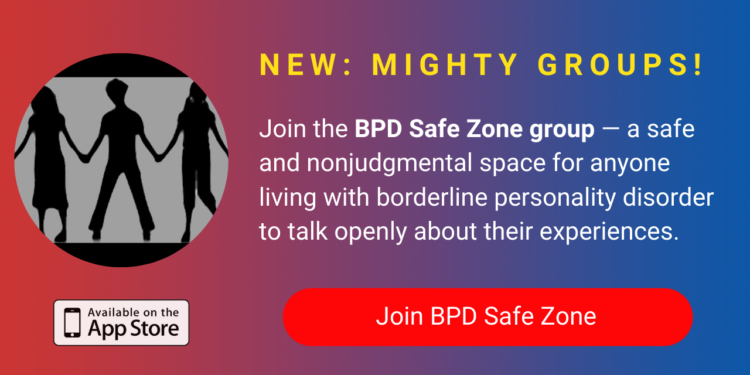A Borderline Personality Disorder Diagnosis Isn't the End of Your Story
In this rapidly evolving modern age, mental health conversations are becoming more normalized, acceptable and even encouraged in certain circles. Gone are the days of whispering the word “therapy” in hushed tones, or hiding mental health difficulties for fear of judgment or misunderstanding. Important conversations are taking place every day, and awareness of mental health conditions continues to develop steadily to help build a more inclusive, positive environment in society.
Approximately one in four people will experience a mental health problem in their life, with depression, anxiety and phobic disorders topping the charts as common issues in the general population. New types of therapy are being researched and practiced daily, employers are being encouraged to consider mental health alongside physical health and every day more and more people are opening up about their personal experiences with mental disorders to inspire and encourage those around them. We are in an era of change and acceptance, something many will say is long overdue.
Despite this important progress and development, there are still those of us battling for recognition in the world of psychology and mental health awareness. While some disorders can be perceived as “on-trend,” more common or more acceptable, personality disorders are still firmly in the closet of shame for many facing these disorders. Despite 5 percent of the population having a personality disorder diagnosis, these at times debilitating illnesses remain an elusive diagnosis, one that is difficult to recognize and treat, and often even harder to come to terms with on a personal level.
Borderline personality disorder (BPD) is a specific condition under the umbrella term of a personality disorder. Also known as Emotionally Unstable Personality Disorder (EUPD), this illness is characterized as a mood disorder, as it manifests in emotional instability, disturbed thought patterns and intense but unstable relationships. In essence, it affects a person’s ability to think, feel and perceive the world around them. It can feel like an emotional roller coaster, in which any minor inconvenience or event can trigger an explosive reaction, varying from extreme elation to overwhelming sadness or despair. Thinking is decidedly black and white, with no room for negotiation in between. Soaring highs and crushing lows are a day-to-day occurrence, to the point it feels almost “normal” to be that way. Sometimes, it isn’t until someone points out your own irrationality that you realize something isn’t quite right with how you react to things, that life can be lived with a stable baseline of emotional reactions, without constant ups and downs.
For years, I simply labeled myself as sensitive or empathetic, something that felt like a reasonable explanation for my uncontrollable emotions. My paranoid thinking about others and their opinions of me didn’t feel wrong or unhealthy; it was my version of normal. Doesn’t everyone worry what others think of them? I would tell myself it was perfectly understandable, that many stayed up at night for hours on end, thinking and rethinking their social interactions for the day, or how any issues that may have arisen were naturally tied to me or my actions. It was all too easy to find a half-baked reason for why I was at fault or to blame for everything bad that happened around me. Self-doubt and punishment become second nature, with positivity or rationality remaining firmly out of reach. This is the reality many may experience with BPD, the way this illness affects every second of day-to0day life. I often think of my brain as the enemy, determined to destroy me at all costs. It can feel like every breath is a struggle, and every interaction holds the potential to bring you crashing down for no valid reason.
All mental illness diagnoses are legitimate and have the right to be recognized; there is no shame in struggling with mental health on any level. But admittedly, there are times I wish I could come home to my loved ones with a simpler label, a diagnosis more widely talked about or known, that can be understood and related to by the vast majority. Having to carry the title of BPD feels like the equivalent of dropping a nuclear bomb on anyone who comes into contact with me. Questions such as:
“How can your personality be an illness?”
“Borderline between what and what?”
“Does that mean you don’t have a personality?”
“That sounds like a made-up illness, surely that can’t be a real thing?”
These are all examples of confusion I have personally experienced, with many treating the diagnosis as suspicious or even ludicrous. This isn’t always the case; there are many who approach the issue with an open-mind and even curiosity, doing their own research to better understand my reality. Unfortunately, misrepresentation in the media and a general lack of knowledge often complicate things.
I remember telling someone way back at the beginning of my recovery, when I was newly diagnosed and severely struggling with acceptance, that I had bipolar disorder. I was ashamed of myself for concealing the truth, but it felt simpler and a lot easier to offer up that explanation, rather than face the questions and doubt of delving into the shadowy world of personality disorders. I thought they would understand the more well-known illness bipolar, rather than the confusing and bizarre term BPD. It was not my proudest moment, but looking back I’m not angry at myself, but society as a whole for making me feel that way. For making me believe that having BPD is shameful and needs to be concealed, when in reality, we have every right to be recognized and accepted in the new wave of pro-mental health rhetoric.
It took a long time for me to realize that having a personality disorder is nothing to be ashamed of; I am just another human being struggling with my brain. I may lack the “thick skin” others have, and everything may hurt just that little bit extra, but I am valid and justified in feeling the way I do. I have an illness, a condition that needs managing and treating, just like any physical illness. I wouldn’t punish myself for breaking a bone, so why do I hate myself for having the label of BPD? I didn’t ask for it or bring it on myself.
This is a universal issue that undoubtedly manifests in all mental health diagnoses, regardless of their prevalence or general stigmatization. Being told there is something “wrong” with you, something that needs to be recognized and treated throughout your life, is an unbelievably hard to accept.
Sadly, it took me a long time to realize these three little letters were a part of my life now, and couldn’t simply be returned like a dress that doesn’t fit. The issue cannot be shrugged off or buried, but needs to be tackled head on with strength and determination. I’m not scared to admit I still struggle some days, and long for a time before this diagnosis colored every aspect of my life. It felt simpler when I believed my often-toxic behavior was normal and OK, and it would be incredibly easy to delve into the land of denial rather than living in my new reality. Acceptance denotes a process of hard work and brutal honesty, of facing the damaged parts of yourself and evaluating how to heal them. But without this, recovery would be elusive and unsustainable.
The first step on the long road to health is facing your demons and giving them a big, welcoming hug. There is no profit in ignoring the issue or burying your head, not when it will merely persist and cause more difficulties. I could have laughed in the face of my psychiatrist and walked away, back into the all-consuming state of ignorance. But then I ask myself, what good would that have done?
Undeniably, I would only find myself back in the same position further down the line, once again being challenged to summon my inner courage and admit that something isn’t right. Denial only exacerbates the issue and prolongs the turmoil, not only for yourself, but those around you who care and want to help.
I am not naive to the fact that this is easier said than done; in fact I am incredibly aware of the challenge of coming to terms with a difficult diagnosis, the mountain that must be climbed. There is no linear path to recovery or acceptance, it is rife with adversity and set backs, with relapse and frustration; but there is also a lot of goodness in this process. The beauty of facing your demons and summoning this inner courage is an inexplicable joy, a moment of pleasant surprise when you realize just how strong you really are, and how far you are willing to go to take your life back.
In the 18 months since I was diagnosed and drove home from the psychiatrist weeping with anger and frustration, I have discovered entire new facets to my persona. The ability to put one foot in front of the other, to have difficult conversations, to put your hands up and admit you need help, to apologize and own your mistakes on the days you lashed out or acted cruelly. Each step is progress and a step in the right direction, to taking control of your life and forcing the illness out of the driver’s seat.
What I want to say to those struggling with a new and difficult diagnosis, is that this isn’t the end of your story. You are not defined by your condition; the label you have received isn’t who you are. The percentage of us who struggle with their mental health and personality disorders are not lesser or weaker in any way. We are simply struggling with an illness, just like anyone who struggles with a physical sickness. BPD is an affliction like any other, and it can be treated and managed.
Your journey does not end there, in that office with the doctor taking notes and giving you leaflets. Far from it. That is actually the start of your path, of the road to recovery and discovering what “normal” life means to you. There is no point pretending it won’t be difficult, that you will not be challenged in a myriad of ways, and some days you’ll wish you never heard the words personality disorder. It is hard, it is sometimes debilitating, it is an incredible challenge; but it is not insurmountable. The mountain can be scaled, and who knows, you might actually discover things about yourself on the way, hidden gems just waiting to be revealed.
Take that first step, and I promise it’ll be worth it.
Instagram: @jessroseauthor
Photo by Laura Dewilde on Unsplash


